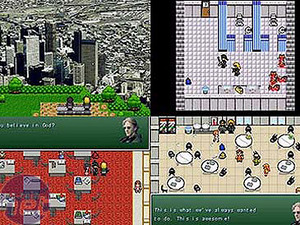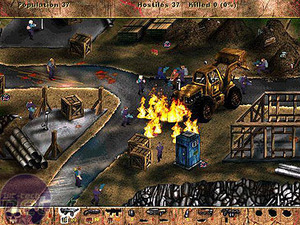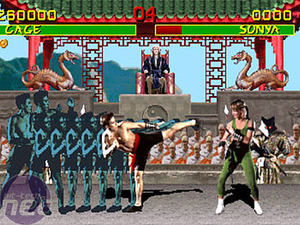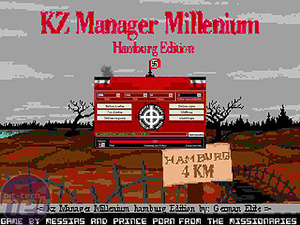Super Columbine Massacre RPG! is in even poorer taste than JFK Reloaded. It allows you to play the roles of Eric Harris and Dylan Klebold, the perpetrators of the real Columbine killing spree, with the initial task of planting bombs in Columbine High School whilst remaining undetected by security guards. Next, you must enter the school and kill as many people as possible. After the pair die, the next level involves fighting characters from the game Doom in Hell, then tackling the devil himself, as portrayed in South Park.
Although Super Columbine Massacre RPG! was accused of glorifying violence, it’s perhaps too ludicrous to do more than trivialise the subject matter. Ironically, at the time of the real Columbine incident, FPS games Doom and Wolfenstein had been blamed for the shooting spree. But then so was the musician Marilyn Manson. More recently, the FBI have concluded that Eric Harris’s psychosis was independent of any gaming interests he may have had.


Super Columbine, left, and Postal, rightThe game Postal also deliberately courted negative publicity. This game is inspired by the phrase ‘going postal’, referring to the number of Vietnam veteran postal workers who have lost their grasp on reality and gone on killing sprees. This is what the game is all about – killing as many innocent bystanders as possible. The second version developed a more sophisticated world where the player’s character is beset by annoyances, and has the choice of either getting round them peacefully or ‘going postal’ and taking more drastic action. The forthcoming third version of Postal will allegedly allow you to play as a serial killer, an eco-terrorist, and that most psychotic of killers, a presidential candidate. Many US retailers refused to sell Postal2, and it’s illegal to even own the game in New Zealand and Australia.
The list goes on and on. Another game which suffered a similar fate Down Under was Manhunt. This is also banned in Germany. The game was linked to the murder of Stefan Pakeerah by Warren LeBlanc in 2004. LeBlank was allegedly obsessed with Manhunt, a game where you play an escaped death-row murder convict on a killing spree. The murder resulted in it being temporarily withdrawn from GAME and Dixons. But police said LeBlanc had committed the crime for drug-related robbery, and Manhunt was actually found in Pakeerah’s house, not LeBlanc’s. This didn’t stop his mother calling for all violent computer games to be banned.


Mortal Kombat, left, and KZ Manager, rightViolence hasn’t been the only cause of controversy – games have also been used as vehicles for racism. For example, KZ Manager lets you take control of a Nazi concentration camp, gassing and working prisoners to death. It’s a resource management game, a bit like Championship Manager for the racially prejudiced. Alternatively, what about Nazi Wolf 3D, which as you might guess swaps the roles in the original Wolfenstein so you’re a white supremacist killing foes of various ethnicities.
Believe it or not, even Mortal Kombat got into trouble in 1992 for its excessive violence and visceral carnage. But most of these are examples of specific titles which courted controversy deliberately by their choice of content. They might have met a similar reaction had they been films or books. However, there’s still something which makes games currently more prone to controversy than older media, and this usually revolves the immersive nature of interactive content.
Although Super Columbine Massacre RPG! was accused of glorifying violence, it’s perhaps too ludicrous to do more than trivialise the subject matter. Ironically, at the time of the real Columbine incident, FPS games Doom and Wolfenstein had been blamed for the shooting spree. But then so was the musician Marilyn Manson. More recently, the FBI have concluded that Eric Harris’s psychosis was independent of any gaming interests he may have had.


Super Columbine, left, and Postal, right
The list goes on and on. Another game which suffered a similar fate Down Under was Manhunt. This is also banned in Germany. The game was linked to the murder of Stefan Pakeerah by Warren LeBlanc in 2004. LeBlank was allegedly obsessed with Manhunt, a game where you play an escaped death-row murder convict on a killing spree. The murder resulted in it being temporarily withdrawn from GAME and Dixons. But police said LeBlanc had committed the crime for drug-related robbery, and Manhunt was actually found in Pakeerah’s house, not LeBlanc’s. This didn’t stop his mother calling for all violent computer games to be banned.


Mortal Kombat, left, and KZ Manager, right
Believe it or not, even Mortal Kombat got into trouble in 1992 for its excessive violence and visceral carnage. But most of these are examples of specific titles which courted controversy deliberately by their choice of content. They might have met a similar reaction had they been films or books. However, there’s still something which makes games currently more prone to controversy than older media, and this usually revolves the immersive nature of interactive content.

MSI MPG Velox 100R Chassis Review
October 14 2021 | 15:04







Want to comment? Please log in.